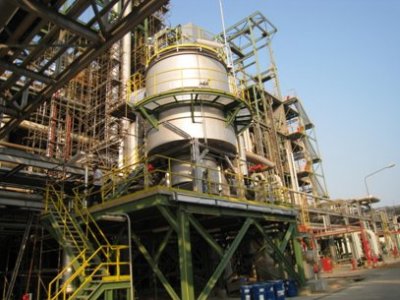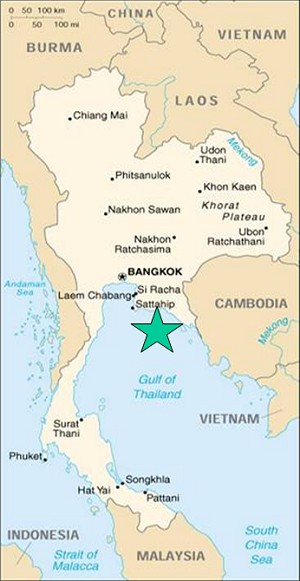Ube Industries, Ltd. (UBE) (President & Representative Director: Hiroaki Tamura) and Mitsubishi Corporation (MC) (President & CEO: Yorihiko Kojima) have been jointly developing a project to reduce nitrous oxide (N2O) in Thailand. Approvals from the Japanese and Thai governments were received on August 2, 2007 and February 27, 2008 respectively. After more than two years since talks began on commercializing the project, it was finally registered by the United Nations (UN) on Jun 16, 2009.
This CDM*1 project, which reduces N2O in the production process of caprolactam*2 (a raw material used to make nylon 6*3) is being undertaken at a plant of Thai Caprolactam Public Co., Ltd. (TCL), an UBE subsidiary in Thailand. This is the world's first such project to be registered by the UN, and UBE's first CDM registered project. It is the 30th UN-registered CDM project for MC.
N2O is a greenhouse gas formed as a by-product at caprolactam plants. It is a contributor to global warming.
The aim of this project is to reduce the amount of N2O in emissions released during the production of caprolactam by adding the catalytic abatement plant and gain approximately 530,000 tons in Certified Emission Reduction (CER) credits (CO2 equivalent) by the end of 2012.
UBE and TCL utilize the N2O abatement plant of Japanese technologies. By reducing the N2O and monitoring the N2O abatement, the companies are contributing to sustainable development of earth and helping to prevent global warming. TCL will continues to show due consideration to the local population in carrying out their business and promote safe operations to reduce N2O alongside the production of caprolactam.
Leveraging its experience, MC helped take this project to its operational stage. The trading company worked with TCL to conduct feasibility studies, handled the relevant application procedures for UN registration, and promoted efforts to gain UN approval. MC also offered its full support to TCL in gaining the necessary financing to bring in equipment, including the complete range of infrastructure at the N2O abatement plant, and the measuring instruments used to monitor operations. Meanwhile, MC plans to sell the emission reduction credits obtained through this project to companies aiming to meet their own emission requirements.
| Company name | Thai Caprolactam Public Co., Ltd. |
|---|---|
| Location | (Head Office) Bangkok, Thailand; (Plant) Rayong, Thailand |
| President & CEO | Charunya Phichitkul (concurrently Managing Executive Officer for Ube Industries, Ltd.) |
| Foundation year | 1990 |
| Number of employees | 414 (as of December, 2008) |
| Shareholders | UBE 91%, Marubeni Group 7%, Others 2% |
| Sector | Produce and sell Caprolactam and Ammonium Sulfate |
| Annual Production | Caprolactam 110,000 tons; ammonium sulfate 460,000 tons |
Catalytic N2O Abatement Project in the tail gas of the Caprolactam production plant in Thailand (photo shows N20 abatement plant)

Tambol Tapong, Muang Rayong District, Rayong Province, Kingdom of Thailand

The contribution of N2O to global warming is 310 times greater than that of CO2. The scale and execution of this project will reduce N2O and therefore benefit the natural environment. Furthermore, by selling emissions credits acquired through this project to companies aiming to meet their reduction targets, MC will also be helping the countries concerned to meet their reduction requirements.
Apart from caprolactam, UBE has facilities producing nylon 6 resin and butadiene rubber in Thailand, is operating three plants as a group and working to achieve a safe environment. The company is striving to co-exist in harmony with regional society. Not only is this project expected to contribute greatly to improving the region's natural environment, it is also gaining considerable attention as the Federation of Thai Industries' first pilot project in industry, and as a means of introducing Japan's recent technologies to Thailand to help deal with environmental problems.
Recognizing the need for the economy and natural environment to co-exist in harmony and make use of market mechanisms, MC is engaged in the business of emissions trading. Applying its know how in CDM, the company performs the following roles:
- Provides advice in project design for business that can gain UN registration (business through which acquisition of emissions credits is possible)
- Gains approval of Japanese government
- Provides project capital in the form of buying and selling emissions credits
By continuing to trade emissions credits all over the world, and from a long term perspective of sustainable development, MC will continue to support both the natural environment and other companies.